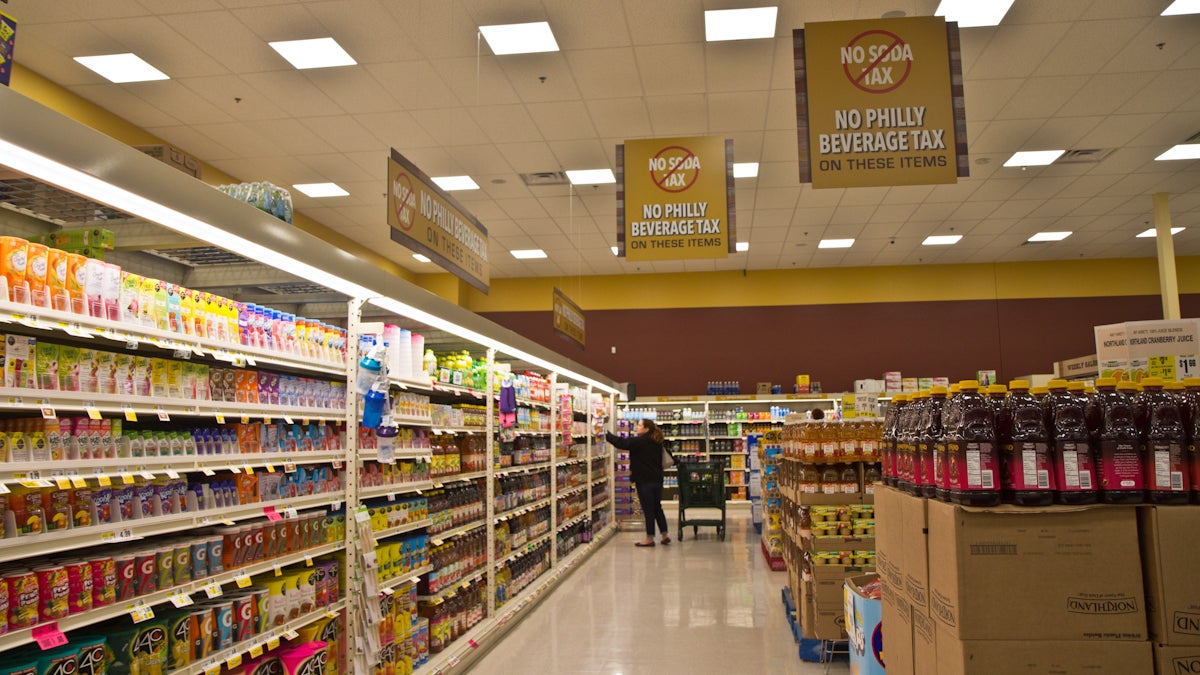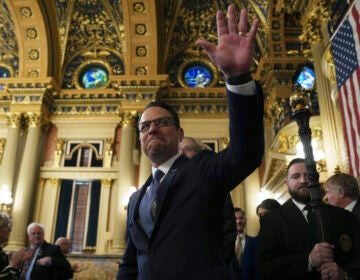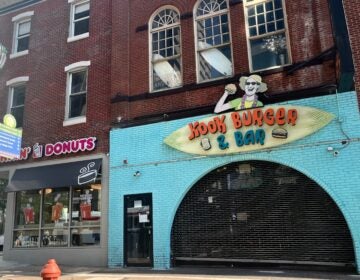The Philadelphia Experiment: Does a soda tax change consumer behavior?
Listen
The Fresh Grocer in the Belmont section of Philadelphia has an aisle dedicated to beverages that aren’t taxed as sweetened beverages. (Kimberly Paynter/WHYY)
These days, Southwest Philadelphia resident Nigeea Mohammed said she rarely does her grocery shopping in the city. That is, ever since a new tax on soda and other sweetened drinks took effect in January.
The 1.5-cents-per-ounce tax applies to regular and diet sodas, as well as teas, juices and even some milk products with added sugar or artificial sweeteners. While the tax is levied on beverage distributors, many stores have raised their prices.
This week marks the tax’s fourth month and a major question – besides whether it will survive a legal challenge from the soda industry – is whether it’s driving people to change their behavior.
“Absolutely, I shop outside the county now,” said Mohammed, who was walking out of a Fresh Grocer in Northwest Philadelphia, one block from the border of Montgomery County. Normally, she shops in Delaware County, but was in the area visiting a friend.
“I absolutely see the difference when I’m out shopping and I look at my receipt I see a big increase, a significant increase,” she said.
Mohammed is not the only one. Of the more than a dozen people across the city NewsWorks/WHYY spoke to for this story, five of them said they have started shopping outside the city limits.
“Hell yeah, it’s not worth it, dude,” said Kate Wilson, a contractor from Delaware County who works in Philadelphia, which has also dramatically raised its cigarette tax.
“A 20-ounce Pepsi now is going for like $2.50. That’s ridiculous,” Wilson said. “I even quit smoking. I was like, ya know what, man? This s–t is probably half my paycheck every week!”
But for every person who said they were shopping outside the city, there were others who said they don’t mind paying the tax.
“I buy every day, so it really doesn’t affect me,” said Alfred Sheed, a construction worker from West Philadelphia who was walking down Market Street, drinking a carton of Arctic Splash sweet tea. “A few cents — I don’t mind helping the cause.”
Most of the money is supposed to go toward expanding subsidized pre-school for 3-and 4-year-olds; creating community schools that offer services, such as health care and summer classes for parents; as well as major renovations at city parks, recreation centers and libraries.
“I’m one of those. If it goes to schools, I’m very happy,” Lisa Brownstein from West Mount Airy said as she browsed the aisles at Weavers Way Co-op.
She doesn’t drink soda, but she does buy sweetened almond milk and thinks those trying to avoid the tax are doing a disservice.
“I do a mentoring program in Philadelphia at the schools and we bring beverages and snacks to the kids and someone whose turn it is next week to bring a snack said, ‘Go buy soda outside the city,’ ” Brownstein said. “And that turned me right off. And I don’t think we should be buying soda for the kids anyway.”
Therein lies the conundrum: Many of those who support the tax think people shouldn’t drink sweetened beverages for health reasons.
But if people stop buying taxed items in Philadelphia, will it generate enough revenue to support the programs it’s supposed to fund?
So far, the tax has brought in just over $19 million in its first three months — about 40 percent of the city’s goal of $46 million by the end of June.
The Revenue Department factored a 27 percent drop in consumption of taxable beverages into its revenue projections and said the city is on track to meet its financial goals.
“If people were like, ‘Soda is my jam, there’s no price I won’t pay for it,’ then we would expect no change,” said Deputy Revenue Commissioner Marisa Waxman. “But we do, based on studies, expect there to be some reaction, so that’s what we modeled out.”
And while our unscientific survey is exactly that, the city and public health researchers from the University of Pennsylvania and Harvard are embarking on a three-year study to find out just how the tax is affecting what people are buying and drinking in Philadelphia, the surrounding suburbs and in Baltimore where there is no such tax.
So far, the researchers have collected data on prices from more than 180 stores and 8,000 customer receipts, according to city spokesman Mike Dunn. Philadelphia’s Health Department plans to release preliminary results in the fall.
WHYY is your source for fact-based, in-depth journalism and information. As a nonprofit organization, we rely on financial support from readers like you. Please give today.




